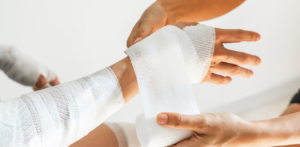
Personal injuries do not always end when the immediate pain fades. These incidents can create a ripple that influences a person’s life for months or years. Car accidents, slip and falls, workplace incidents, and other traumatic events may result in physical injuries, mental health challenges, and ongoing pain that can persist long after the body seems healed. Chronic pain, limited mobility, anxiety disorders, and financial strain may follow. This article explores the long-term effects of personal injuries and offers ways to address these obstacles while protecting your overall well-being.
Understanding the Range of Long-Term Injuries
Injuries can happen at any time. Broken bones, back injuries, carpal tunnel syndrome, and head injuries are some of the most common physical injuries. Some of these issues clear up with rest and medical treatment, while others turn into long-term injuries that may never be fully resolved. When a serious injury stems from else’s negligence, it can also lead to a personal injury lawsuit.
Studies reveal that many individuals deal with lingering issues after accidents. According to the Centers for Disease Control and Prevention (CDC), traumatic brain injuries (TBIs) contributed to nearly 61,000 deaths in the United States in the previous year. Though not every traumatic brain injury is fatal, survivors face lasting complications such as memory problems, difficulty concentrating, and emotional distress.
Common Forms of Lasting Harm
- Traumatic Brain Injuries (TBIs): These can cause changes in cognitive function, mental health, and behavior. A person might experience trouble focusing, mood swings, or anxiety disorders long after a traumatic event.
- Chronic Pain: Neck, shoulder, and back injuries can lead to ongoing pain, affecting a person’s ability to work or enjoy everyday activities.
- Carpal Tunnel Syndrome: Repetitive motion injuries can linger and make everyday tasks more difficult.
- Broken Bones and Joint Damage: Even after healing, these injuries might reduce mobility or cause future discomfort.
- Permanent Disfigurement: Facial scarring or other forms of permanent disfigurement can produce physical and emotional effects.
Physical Injuries and Lingering Impacts
 Many physical injuries seem resolved once the bandages come off. However, deeper issues can persist. A catastrophic injury can restrict your day-to-day routine. Reduced mobility may make chores like climbing stairs feel like a mountain trek. Chronic pain may disrupt sleep. Physical therapy can help manage these obstacles and improve mobility, but therapy can also take a long time and may not bring total recovery.
Many physical injuries seem resolved once the bandages come off. However, deeper issues can persist. A catastrophic injury can restrict your day-to-day routine. Reduced mobility may make chores like climbing stairs feel like a mountain trek. Chronic pain may disrupt sleep. Physical therapy can help manage these obstacles and improve mobility, but therapy can also take a long time and may not bring total recovery.
When trauma strikes the bones, muscles, or joints, the body can develop scar tissue. This tissue is less flexible and may result in stiffness or limited mobility. Back injuries, for instance, can be slow to heal, with back pain sometimes flaring up without warning. Neck and shoulder conditions can also develop, resulting in chronic pain that needs ongoing attention.
Some people manage these conditions with medication, physical therapy, or assistive devices. Treatment can grow costly, which adds another layer of stress.
Emotional and Psychological Effects
Serious trauma can bring emotional distress that lingers for years. Post-traumatic stress disorder often surfaces after events like car accidents or a severe head injury. Other psychological effects may involve anxiety, depression, or social isolation. These conditions can interfere with a person’s quality of life, personal relationships, and day-to-day routines.
The emotional toll from a traumatic event might remain long after physical wounds fade. Symptoms can involve nightmares, flashbacks, or panic episodes. This emotional impact can appear unexpectedly, especially when triggers surface, like driving past the site of a crash. Other symptoms include:
- Stress Responses: Irritability, restlessness, and trouble sleeping may occur due to heightened stress.
- Difficulty Concentrating: Ongoing worry can affect focus and general cognitive function.
- Social Isolation: Fear or emotional distress can limit a person’s willingness to engage with friends or family.
To address these concerns, professionals often suggest that individuals develop coping strategies. These include counseling, support groups, or mindfulness activities. Mental health support can be essential in maintaining overall well-being and preventing these conditions from affecting every part of a person’s life.
Financial Strain and Lifestyle Adjustments
Personal injuries often affect more than the body and mind. Medical expenses can pile up, and lost wages from missed work can strain a family’s finances. The legal process involved in a personal injury claim may add confusion at a time when someone is already dealing with significant challenges.
According to the National Safety Council (NSC), accidents remain a top cause of unintentional injuries in the United States, and these incidents can have far-reaching consequences.
A personal injury case may involve immediate and long-term costs. Some of those include:
- Hospital Stays and Surgeries: These can reach thousands or even tens of thousands of dollars.
- Ongoing Therapy: Physical therapy or counseling might be required for months or years.
- Adaptive Equipment: Wheelchairs, braces, or other items can add to a person’s expenses.
- Prescription Medications: Pain management or mental health medications might be needed for the foreseeable future.
On top of that, there may be hidden expenses like transportation to medical care or in-home help. A catastrophic injury might demand house modifications, such as ramps or widened doorways. Each new need forces the person and their household to readjust their finances.
Impact on Personal Relationships and Social Life
 Serious injuries can change personal relationships and social activities. Chronic pain or the emotional effects of personal injuries may mean someone avoids gatherings or hobbies they once loved. This withdrawal can spark tension within families or friendships. Loved ones might feel powerless to help. The injured person might feel guilt about needing additional care.
Serious injuries can change personal relationships and social activities. Chronic pain or the emotional effects of personal injuries may mean someone avoids gatherings or hobbies they once loved. This withdrawal can spark tension within families or friendships. Loved ones might feel powerless to help. The injured person might feel guilt about needing additional care.
Injury prevents many individuals from maintaining past routines. Partners or spouses may need to take on more responsibilities at home, which can create strain. This shift might lead to discussions about how to split household tasks in a fair way. Children might sense a difference in their parent’s ability to engage in playful activities. To help you cope, here’s what you should do:
- Communication: Families who talk openly may adapt more easily to new realities.
- Seeking Outside Support: Therapists or counselors can guide families through challenges.
- Shared Responsibility: Dividing chores and errands in a balanced manner can help caregivers avoid burnout.
These steps can protect mental health and keep personal relationships strong.
The Legal Process of Seeking Compensation
When injuries arise because of someone else’s negligence, you may have grounds to pursue compensation through a personal injury lawsuit. This differs from criminal proceedings and focuses on whether an individual or organization is legally responsible for paying for your damages. A personal injury lawyer can guide an accident victim through the legal process.
Building a Personal Injury Case
A successful personal injury claim often involves showing that someone’s carelessness or wrongdoing led to harm. Evidence may include medical records, photos, witness statements, and proof of how the injury prevents normal activities. The injury claim also needs to illustrate how much compensation you need for medical bills, lost wages, and non-economic damages like pain and suffering.
- Collecting Documentation: Keep track of medical treatment, prescriptions, and any recommended therapy.
- Noting Lost Income: Gather pay stubs or employment records if you missed work.
- Measuring Future Costs: Assess possible ongoing care, reduced mobility, and mental health support.
Working with an experienced personal injury lawyer may speed up the process. An experienced team understands local laws and knows how to deal with insurance companies. They can estimate fair compensation for immediate needs and future costs.
How Much Compensation Can You Receive?
Each case is unique. The final amount depends on the severity of the injury, how it affects a person’s life, and whether there is lasting harm like permanent disfigurement. Some factors that go into a settlement or award include:
- Medical Expenses: Current and projected costs.
- Lost Wages: Paychecks missed during recovery, plus any future earnings lost.
- Property Damage: Repairs or replacement if personal property was harmed.
- Pain and Suffering: Ongoing pain, emotional distress, and psychological effects.
- Reduced Earning Capacity: If the injury prevents you from doing the same job or earning at the same level.
Insurance companies often try to reduce payouts. They may question the severity of a head injury or the legitimacy of chronic pain. A personal injury lawyer can manage these hurdles, negotiate with insurers, and take the matter to court if necessary.
Practical Steps Toward Recovery
While some individuals bounce back quickly, others confront physical pain or emotional distress that lingers. If you are dealing with the effects of personal injuries, consider these steps:
- Get Thorough Medical Treatment: Follow doctor recommendations, attend physical therapy, and keep medical records.
- Focus on Mental Health: Seek counseling if you notice signs of stress, depression, or anxiety.
- Document Everything: Write down changes in your symptoms and gather supporting documentation for your personal injury claim.
- Contact an Experienced Personal Injury Lawyer: If someone else’s negligence caused your injuries, legal help may be a path to fair compensation.
- Develop Coping Strategies: Explore relaxation exercises, group therapy, or gentle activities that help manage ongoing challenges.
Reclaim Your Life with the Help of an Experienced Personal Injury Legal Team
If you face the long-term effects of personal injuries in Hawaii, Recovery Law Center is here to assist you. Our personal injury lawyer in Hawaii understands how these situations impact your daily life, and we have an experienced team prepared to pursue compensation on your behalf.
We are ready to gather medical records, handle negotiations, and fight for fair compensation that reflects your medical bills, lost wages, and other damages. Protect your person’s quality of life and find peace of mind by letting us help.
Schedule a no-obligation consultation with us today. We will listen to your story, review your personal injury case, and walk you through your options. You deserve caring, thorough support as you move ahead. Contact our law firm, and let us stand by your side in the legal process.















